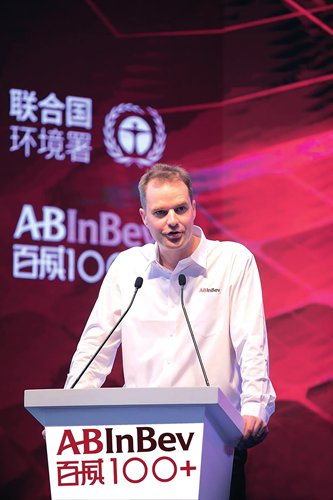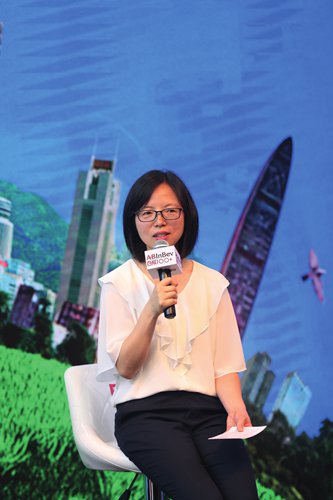HOME >> BUSINESS,METRO BEIJING
Beat air pollution, recharge Mother Earth
By Huang Yiran Source:Global Times Published: 2019/6/10 18:18:03
AB InBev joins UNEP in celebrating World Environment Day by launching renewable energy project at world’s largest Budweiser brewery
On June 5, a pop-up installation, in the form of a giant bottle-shaped battery fully covered with solar panels, landed on the bank of Guangzhou's Pearl River. Fitted with a screen that shows the battery's real-time power volume, the installation was created with 100 solar panels and an energy storage system that collects renewable energy generated by the panels during the day. It supplies clean energy to the recharging station in a non-stop fashion, so that all sound and light devices inside the big bottle are powered by 100 percent renewable electricity.
This "giant beer bottle" is leading global brewer AB InBev's recharging station project. On June 5, to celebrate the 48th World Environment Day (WED), AB InBev inaugurated its renewable energy project at Budweiser's world's largest brewery in Foshan, South China's Guangdong Province. More than 100 guests were present to mark the milestone. Meanwhile, AB InBev also released its limited-edition BUD WED can exclusive design at the ceremony. It has a catchy slogan that reads "BUD pledges to be 100 percent brewed by renewable electricity by 2025."
As a responsible company, AB InBev focuses on its green and sustainable development. It invested a total of 24.5 million yuan ($3.5 million) in the Foshan brewery renewable energy project, and installed more than 17,200 pieces of 285-watt solar panels that cover about 50,000 square meters. By the end of 2019, nine of AB InBev's Chinese breweries will be installed with solar panels that cover a combined floor area of 410,000 square meters. Altogether, they have a capacity of 41 megawatts and an estimated annual power output of 41 million kilowatt hours. By the end of 2019, around 30 percent of Budweiser's annual volume in China will be brewed with renewable electricity. AB InBev's goal is to have Budweiser 100 percent brewed by renewable electricity by 2025.
The Global Times talked to Jan Craps, CEO and president of APAC, AB InBev; He Yong, executive vice secretary-general and beer branch secretary-general of the China Alcoholic Drinks Association (CADA); Zhu Sijie, associate of Rocky Mountain Institute; and Yuan Min, research associate of World Resources Institute, to get their opinions about the significance of AB InBev's Foshan project.

Jan Craps: As a responsible corporate citizen, we are proactively echoing the call of the United Nations' Sustainable Development Goals (SDGs) in response to our renewed efforts with external benchmarks. The Green China Strategy includes water stewardship, circular packaging and the use of renewable energy. These three aspects are the most important areas in our business and also the areas where we can maximize our positive impact. AB InBev prioritizes these three aspects because, first of all, beer comes from natural ingredients, and brewing our beers relies on a healthy environment and thriving communities. Besides, we have a strong track record in sustainability and continue to build on our achievements with ambitious goals that positively impact our communities. Sustainability is the core of our business because we are building a company that lasts and brings people together for a better world now and for the next 100-plus years.
The beer business is a community business. A sound environment is beneficial to our production and development, helping us guarantee high-quality ingredients. Our renewable energy programs will give back to the local communities where our breweries are based, helping create cleaner environments for the communities.
Responding United Nation's Environment Programme's (UNEP) agenda, the green energy upgrade of the Foshan Brewery not only promotes Foshan's industrial layout and structure transformation into a green low-carbon prospect, but also improves the Greater Bay Area's ecological and environmental soundness. We are leading the industry in innovation and sustainable development.
The Foshan program is one of the milestones on our journey of our commitment to use 100 percent renewable electricity. The expansion of the renewable energy project will support the advancement of our Green China strategy and successful accomplishments of the 2025 sustainability goals.
Environmental issues are not only our biggest challenge, but also business opportunities. We see that our consumers, especially millennials, continue to voice their passion and concern for the environment. They are willing to spend more on a product from a sustainable brand. We are on a journey to embed sustainability throughout our business and across our value chain, enabling growth and opportunity for our company and communities in our markets.

He Yong: As the beer industry's leading player, AB InBev has a purpose of promoting renewable energy that's shared by CADA. We hope that while pursuing their value realization, companies can also make continuous efforts to give back to society by cutting air pollution and helping save our blue skies and bring great flavors to Chinese consumers. We do look forward to brewers ensuring blue skies and clean air for our future generations.
CADA established the Alcohol and Social Aspects Organization (SAO) in 2015 and stresses that alcohol companies should shoulder their responsibility not only in energy consumption and environmental protection, but also in responsible drinking and activities for public good. I believe that responsibility should be an integral part of your product. Now CADA is working on releasing new mandatory standards such as a pollution discharge standard and a cleaner production standard. In the future, more standards will be carried out. We also hope to introduce a production license that will bond with companies' environmental protection goal.

Zhu Sijie: China has already passed and published a responsibility scheme for the consumption of renewable energy, putting forward clear requirements for green consumption. It is believed that corporate procurement of renewable energy will play an increasingly important role in boosting the growth of such energy sources. We hope that more companies from different sectors can join in this meaningful pursuit, and together drive the development of renewable energy and the low-carbon transformation of China's energy sector in a marketable manner.

Yuan Min: Being a Fortune 500 Fast Moving Consumer Goods (FMCG) company, AB InBev embraces impactful measures for its sustainable development, which can help companies enhance their resource utilization in a more efficient way. Its successful experiences will have positive, exemplary effects on companies with similar aspirations so that they can apply such experiences to their own supply chain. This will bring great meaning to Chinese FMCG companies' upgrade and transformation from being extensive to intensive in terms of its growth model, and help copilot a green future.
This "giant beer bottle" is leading global brewer AB InBev's recharging station project. On June 5, to celebrate the 48th World Environment Day (WED), AB InBev inaugurated its renewable energy project at Budweiser's world's largest brewery in Foshan, South China's Guangdong Province. More than 100 guests were present to mark the milestone. Meanwhile, AB InBev also released its limited-edition BUD WED can exclusive design at the ceremony. It has a catchy slogan that reads "BUD pledges to be 100 percent brewed by renewable electricity by 2025."
As a responsible company, AB InBev focuses on its green and sustainable development. It invested a total of 24.5 million yuan ($3.5 million) in the Foshan brewery renewable energy project, and installed more than 17,200 pieces of 285-watt solar panels that cover about 50,000 square meters. By the end of 2019, nine of AB InBev's Chinese breweries will be installed with solar panels that cover a combined floor area of 410,000 square meters. Altogether, they have a capacity of 41 megawatts and an estimated annual power output of 41 million kilowatt hours. By the end of 2019, around 30 percent of Budweiser's annual volume in China will be brewed with renewable electricity. AB InBev's goal is to have Budweiser 100 percent brewed by renewable electricity by 2025.
The Global Times talked to Jan Craps, CEO and president of APAC, AB InBev; He Yong, executive vice secretary-general and beer branch secretary-general of the China Alcoholic Drinks Association (CADA); Zhu Sijie, associate of Rocky Mountain Institute; and Yuan Min, research associate of World Resources Institute, to get their opinions about the significance of AB InBev's Foshan project.

Jan Craps, CEO and president of APAC, AB InBev Photo: Courtesy of AB InBev
Jan Craps: As a responsible corporate citizen, we are proactively echoing the call of the United Nations' Sustainable Development Goals (SDGs) in response to our renewed efforts with external benchmarks. The Green China Strategy includes water stewardship, circular packaging and the use of renewable energy. These three aspects are the most important areas in our business and also the areas where we can maximize our positive impact. AB InBev prioritizes these three aspects because, first of all, beer comes from natural ingredients, and brewing our beers relies on a healthy environment and thriving communities. Besides, we have a strong track record in sustainability and continue to build on our achievements with ambitious goals that positively impact our communities. Sustainability is the core of our business because we are building a company that lasts and brings people together for a better world now and for the next 100-plus years.
The beer business is a community business. A sound environment is beneficial to our production and development, helping us guarantee high-quality ingredients. Our renewable energy programs will give back to the local communities where our breweries are based, helping create cleaner environments for the communities.
Responding United Nation's Environment Programme's (UNEP) agenda, the green energy upgrade of the Foshan Brewery not only promotes Foshan's industrial layout and structure transformation into a green low-carbon prospect, but also improves the Greater Bay Area's ecological and environmental soundness. We are leading the industry in innovation and sustainable development.
The Foshan program is one of the milestones on our journey of our commitment to use 100 percent renewable electricity. The expansion of the renewable energy project will support the advancement of our Green China strategy and successful accomplishments of the 2025 sustainability goals.
Environmental issues are not only our biggest challenge, but also business opportunities. We see that our consumers, especially millennials, continue to voice their passion and concern for the environment. They are willing to spend more on a product from a sustainable brand. We are on a journey to embed sustainability throughout our business and across our value chain, enabling growth and opportunity for our company and communities in our markets.

He Yong, executive vice secretary-general and beer branch secretary-general of CADA Photo: Courtesy of AB InBev
He Yong: As the beer industry's leading player, AB InBev has a purpose of promoting renewable energy that's shared by CADA. We hope that while pursuing their value realization, companies can also make continuous efforts to give back to society by cutting air pollution and helping save our blue skies and bring great flavors to Chinese consumers. We do look forward to brewers ensuring blue skies and clean air for our future generations.
CADA established the Alcohol and Social Aspects Organization (SAO) in 2015 and stresses that alcohol companies should shoulder their responsibility not only in energy consumption and environmental protection, but also in responsible drinking and activities for public good. I believe that responsibility should be an integral part of your product. Now CADA is working on releasing new mandatory standards such as a pollution discharge standard and a cleaner production standard. In the future, more standards will be carried out. We also hope to introduce a production license that will bond with companies' environmental protection goal.

Zhu Sijie, associate of Rocky Mountain Institute Photo: Courtesy of AB InBev
Zhu Sijie: China has already passed and published a responsibility scheme for the consumption of renewable energy, putting forward clear requirements for green consumption. It is believed that corporate procurement of renewable energy will play an increasingly important role in boosting the growth of such energy sources. We hope that more companies from different sectors can join in this meaningful pursuit, and together drive the development of renewable energy and the low-carbon transformation of China's energy sector in a marketable manner.

Yuan Min, research associate of World Resources Institute Photo: Courtesy of AB InBev
Yuan Min: Being a Fortune 500 Fast Moving Consumer Goods (FMCG) company, AB InBev embraces impactful measures for its sustainable development, which can help companies enhance their resource utilization in a more efficient way. Its successful experiences will have positive, exemplary effects on companies with similar aspirations so that they can apply such experiences to their own supply chain. This will bring great meaning to Chinese FMCG companies' upgrade and transformation from being extensive to intensive in terms of its growth model, and help copilot a green future.
Posted in: COMPANIES,METRO BEIJING